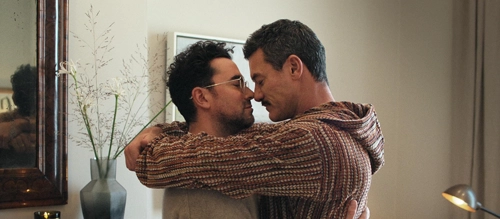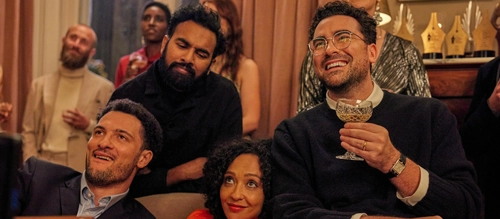Good Grief (2023) Review

Good Grief (2023)
Director: Daniel Levy
Screenwriter: Daniel Levy
Starring: Daniel Levy, Ruth Negga, Himesh Patel, Luke Evans, Arnaud Valois, Celia Imrie, David Bradley
Marcus (Daniel Levy) and Oliver (Luke Evans) are a happy, affluent couple surrounded by doting friends, enjoying a successful literary career and festive fireside singalongs. They seem to be living a picture book life until one evening a drunk driver changes all that, leaving Marcus to find his way without the man he loves. His friends, Thomas (Himesh Patel) and Sophie (Ruth Negga), are there to hold his hand through the aftermath, though they don’t seem particularly well-equipped for the challenge.
As the anniversary of Oliver’s death approaches, Marcus finally feels strong enough to open the last Christmas card his husband ever wrote for him. Only, it isn’t a Christmas card. Instead, it’s a note explaining Oliver had met someone and wanted to ‘explore’ this new relationship outside of the marriage. Marcus is now left having to deal with a new style of grief. A more complicated grief.
Without a chance to argue, fight for his relationship, or gain any closure, Marcus is adrift.
In order to try and ground himself, Marcus offers to take Sophie (Ruth Negga) and Thomas (Himesh Patel) to Paris, secretly wanting to see the life Oliver was hoping to build without him.
Good Grief is Daniel Levy’s feature directorial debut, and unfortunately it’s a far cry from the brilliance that was his television sitcom ‘Schitt’s Creek‘ (2015-2020); a series in which Levy revealed his superpower – creating LGBTQ+ narratives that aren’t issues-based. Levy’s stories aren’t about the plights of being part of that community, rather the joy of it. His characters’ sexualities are present and an important part of the plot but never the driving force behind it. His characters live in a bubble of acceptance and it’s a breath of fresh air.
Good Grief is obviously about the trauma of grief; a universal condition that almost everyone on the planet can relate to in some way. However, some of Levy’s artistic choices are alienating rather than uniting. Marcus, Oliver, Sophie and Thomas occupy a very specific section of society, and their grief is seen through this filter. The idea behind choosing very affluent protagonists is presumably to allow the film to focus entirely on the grief and the journey of self-discovery Marcus is on, something that is easier to do if your characters aren’t also worried about work/paying bills/childcare.

The other misstep is the choice to frequently show clips of the three friends really bonding and laughing in a silent montage style, soundtracked by overly sentimental music. It is a real shame to not allow the audience into these moments. We are told this group of people are brilliant friends, but we don’t really see it in their interactions with each other. Thomas (Himesh Patel) and Marcus in particular are an awkward pairing, their status as exes adding a layer of story that seems completely unnecessary because it leads nowhere.
Like so many films of this style, all the characters work in the arts or in publishing. Is this because creators can’t imagine a world where people aren’t artistic? Or is it because there’s an assumption that only writers and artists can speak emotionally? Every character in Good Grief is extremely earnest. Every one of them is an open book. There’s very little subtext, and this makes the dialogue frankly unbelievable.
There is nothing specifically wrong with Good Grief, but it is still left wanting. It is a slow burn of a film where not much happens, but not every film can be an action-packed romp. The cast is a strong one, including beloved thesps David Bradley and Celia Imrie. Levy is exceptionally gifted at playing someone under the shadow of grief. There are moments where he portrays a vulnerability that is truly raw and genuine. And Ruth Negga really stands out with her portrayal of the self-destructive Sophie. But it just doesn’t live up to its potential.
The title and the cast promise so much, and they offer the grief in abundance, it’s just unclear where the good is.
Score: 15/24

